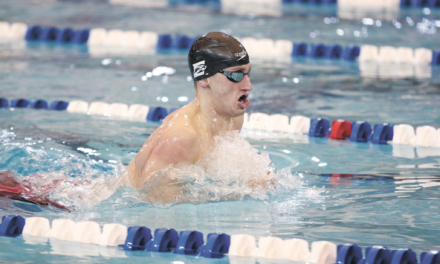
The Emory club women’s water polo team huddles at last weekend’s Emory Invitational (top left). Senior Hayley Huffman takes a shot on an opposing team’s goal (top right).
Senior Shannon Lin passes to a teammate (bottom left). Masters of Public Health student Caitlin Casey battles the ball away from the opposition (bottom right). | Courtesy of Abigail Chambers
By Ryan Smith
Seven years ago, the Emory women’s water polo team was a group of 10 players who saw the team as a hobby rather than a commitment. Fast forward to 2014, and it has blossomed into one of the most competitive club teams in the nation, a unique blend of veterans and novices all tied together by their love for the sport and one another.
Each player has their own story about how they wound up in the Woodruff P.E. Center pool. Senior Abigail Chambers was a swimmer who suffered an injury in high school and was forced to pick up a new sport in college. For junior Adi Rosenthal, now the team’s president, a competitive water polo team was a crucial part of her decision when choosing a college. Assistant Coach Neal Laxpati has 15 years of experience with the sport and is pursuing a MD/Ph.D in Biomedical Engineering at Emory and Georgia Tech while playing goalie for the Tech men’s team.
Fittingly, the Eagles are a bit of an anomaly in the Southeast division of the College Water Polo Association (CWPA), a group dominated by Florida schools that play three league tournaments against each other in the spring and participate in invitationals in the fall. A team’s strategy can be heavily influenced by location – the Florida teams tend to be strong swimmers who play up-tempo, while other teams are more focused on strategy and fundamentals. Emory, a Georgia school in a division full of Floridians, sees itself as a middle ground.
“I think we’re kind of in between,” Chambers said. “We have a lot of girls who come from a swimming background, which gives us a lot of speed. But we also have girls who played in high school.”
This diverse bunch results in what Chambers calls an “intellectual” approach, predicated on chemistry and familiarity with teammates. The close-knit Eagles squad has been able to build a reputation in the pool for both their talents and intelligence.
“Being the team with the highest GPA in the country really shows in the pool by how smart we play,” Rosenthal said, adding that the team often picks up compliments from both opposing teams and referees for their cerebral play.
The team had a splendid opportunity to showcase itself against teams both in and out of the Southeast Division last weekend when they hosted the second annual Emory Invitational, which featured three days of matches from teams across the region. Participants ranged from big-name Division I schools – Vanderbilt University (Tenn.), Florida State University, University of Florida, University of North Carolina, Virginia Tech and Georgia Tech – to local squads – Georgia United and Lakeside High School.
The Eagles broke into two teams, “Emory 1” and “Emory 2,” in order to give each player the best shot at playing time and the chance to make a statement for inclusion on the Eagles’ top team in the spring.
“It’s a lot of seeing where people fit in and seeing how the team works together,” Chambers said.
The results were encouraging. “Emory 1” defeated Vanderbilt 11-9 on Saturday and took University of Florida to overtime in a 12-10 loss. Rosenthal shined with a team-high five goals against Florida, while sophomore Julia Caldwell led with four against Vanderbilt.
Not to be outdone, the “Emory 2” claimed a Division I win of their own, easily topping Georgia Tech 9-4 on Sunday. Senior Amanda Durbin led the way for Emory with three goals.
“[Playing Division I schools] can be a little intimidating for the new players, but we’re really good at keeping each other calm and keeping each other in check,” Chambers said. “We compete really well with those teams.”
It was a par for the course for a team that excels in the pool by first building strong relationships outside of it. Laxpati, a veteran of the sport who’s played since high school, praised his team not only for their dedication and perseverance, but the ways in which they’ve grown as human beings.
“The point of what we’re doing is not to win games or go to Nationals,” Laxpati said. “The point is to build a program where we can build strong, amazing women.”
– By Ryan Smith, Associate Editor
This article was updated on Friday, Nov. 7 at 4:45 p.m. to reflect a change in the sentence “Not to be outdone, the ‘Emory 2’ claimed a Division I scalp of their own…” The word “scalp” has been changed to the word “win.”
The Emory Wheel was founded in 1919 and is currently the only independent, student-run newspaper of Emory University. The Wheel publishes weekly on Wednesdays during the academic year, except during University holidays and scheduled publication intermissions.
The Wheel is financially and editorially independent from the University. All of its content is generated by the Wheel’s more than 100 student staff members and contributing writers, and its printing costs are covered by profits from self-generated advertising sales.




